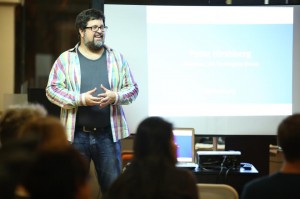Not that I follow his work everyday, but I have no doubt that Steve Wrubel has the pulse of the PR people at the edge. He just wrote about the GeoCoding of Conversations that Topix is doing which is a great and simple tool that should also be available on a broader basis from someone like Technorati. In the post, Steve suggested some of the most basic data points which PR people need, to understand the nature of the conversational network including:
- language
- loud(ness)
- speed (aka velocity)
- accelerating/decelerating
The odd thing to me is that the other examples are really so very basic in nature – barely the price of admission in my book. If this is where the PR industry is at, they are about to get a drubbing at the hands of interactive agencies who are smart enough to seize the opportunity. The new feature from Topix however, is merely a localization tool akin to what Amazon does with Purchase Circles – a personally relevant set of insights based on local geography. The professional analytic tools that create meaning from the data points have the potential to finally let interested people understand the world beyond their physical and virtual connections – what people are saying, what people are thinking and how people feel about almost anything. The most important elements that need to be understood are:
- Persona of person communicating (or better still Identity)
- Tone of the remarks (like or hate)
- historical perspective (more of a fan or detractor)
- relative influence (on other influencers, on specific communities, in general)
- nature of primary information (product suggestion, customer service complaint, recommendation, etc…)
- depth of company/product knowledge
- tag based cluster and visual pivot points – i.e. the visual display of information – being able to slice the data according to any point of interest or shared trait
Most importantly, the potential audience goes way beyond the PR and Communications industry. It includes every employee, every investor and even every customer as well as the general public. Access to “near perfect information” as I speak of at the BrainJams events extends to the sphere of conversation as well as up to the minute accurate directory data. This was the core element to the work I have done on “The Communications Strategy“. This “Open Source” approach to company/product/organization conversations will enable smart companies to move beyond their traditional brands and into TrustMarks – well on their way to the pinnacle of becoming a Lovemark.
While interactive agencies may be more apt to seize the opportunity due to their hunger and nimbleness, the communications industry is best poised to help all of these stakeholders understand what it all means and leverage the key insights to the fullest. Isn’t it true that the best podcasters are those with a professional understanding of how to communicate via the audio medium? The same principle is at work here since communications and public relations people are those with the best skills at communicating ideas and knowledge. The great news from my perspective is that contextualizers like myself who interpret the data to generate creative, insightful, empowering communication pieces for all aspects of the conversation are about to be in very high demand. This principally requires a wider breadth of understanding about the world around us, how things work, how to help people and most importantly, having an authentic desire to help people and the ability to bring your entire self to whatever work you do.
For over 4 years I re-quoted Patricia Seybold’s article time and time again – “[Companies need to]…take responsibility for disseminating all of the product-related information the customer needs to buy and enjoy the product”. Most companies are still afraid that their customers might say something bad about their product on their sites, or even worse, they still actively censor legitimate criticism that could be helping them improve – but instead all it proves is that the company does not get it and they can not be trusted.
In the Knowledge Economy, the most successful companies will have brands that create trust by empowering their customers and stakeholders with the knowledge and ability to enjoy their lives more by saving them time and furthering their life goals. Now more than ever, it is about the complete relationship between customers and the people within your organization, not between the people and your CRM database.
Conversal was originally founded on these insights – many others are now working towards them with some very interesting improvements beyond even these core elements. One of which, BuzzLogic, I have been advising on an informal basis for several months. I felt it necessary to disclose this publicly as more and more people have been asking me for advice within the industry and I want to avoid any potential conflicts of interest ahead of time if at all possible. They are doing some really incredibly innovative things that I hope to be talking with you about in the future.
Technorati Tags: ad-hoc collaboration, customerservice, knowledgeeconomy, NPTECH, thecommunicationsstrategy, The Open Web, Web2.1
